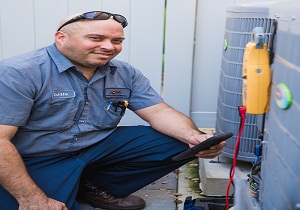
Check the Ratings
There are three types of ratings that can help you choose an HVAC that is friendly to the environment. SEER, AFUE, and HSPF can give you an idea of how the HVAC will perform in certain circumstances.
- Seasonal Energy Efficiency Ratio:The SEER rating is designed to give you a feel for the HVAC system’s efficiency during a hypothetical cooling season. The higher the SEER number, the more efficient the cooling unit will be. Numbers go up to the outlier 42, with 30.5 being readily available. Many states requiring a minimum rating of 13 or 14.
- Annual Fuel Utilization Efficiency: AFUE measures the efficiency of furnaces, boilers, and water heaters, and provides a rating. It’s used to create the EnergyGuide label for appliances and to achieve the EnergyStar endorsement for efficiency. A higher AFUE rating means higher efficiency. Because the AFUE represents a percentage, the theoretical highest rating is 100 percent, with central electric heaters and baseboards being able to achieve that level. Natural gas condensers may achieve up to 97 percent.
- Heating Seasonal Performance Factor: For heat pumps, the HSPF is the important number. A larger HSPF indicates greater efficiency. A rating of 8 or higher is considered efficient and may be eligible for a tax break.
Bigger Isn’t Better
Bigger isn’t always better. An HVAC system that is designed for a space much larger than what you have will use too much energy to do its job compared with a smaller unit that suits the same area. Most HVAC systems are designed to work at peak efficiency when fully engaged. A too-large HVAC system will never be fully engaged.
Too Small Is Problematic
An HVAC system that is too small for the space will always have to work harder to meet heating and cooling goals. It can result in cool, clammy spots as the humidity in the air isn’t properly removed. It also results in more wear and tear and having to replace the system sooner than it’s designed to be.
The Right Size
Making sure the HVAC system is sized correctly for your space will help keep the HVAC running efficiently while providing the most comfortable atmosphere for everyone. This reduces energy waste and allows the system to run longer throughout its normal lifespan, which reduces the waste that happens when the system is replaced.
By choosing an energy-efficient system, you’re helping the environment, but you’re also helping yourself through reduced costs. If you need more information, contact Cox Heating & Air Conditioning to find the right environmentally friendly HVAC system for you. Visit www.coxair.com to get started.




Leave a Reply